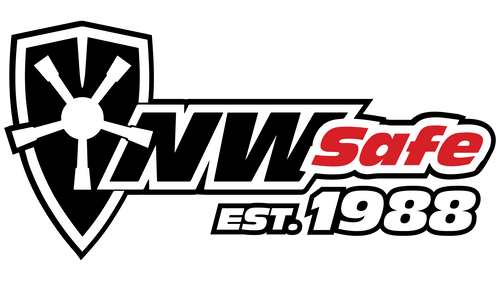Don’t Let Heat Erase What Matters Most
Fire-resistant safes offer peace of mind by safeguarding essentials against raging temperatures and delayed response times.
Originally Published .11.2020 | Last Updated 9.27.2025
We’re not going to beat around the bush. There is no such thing as a ‘fireproof safe.’
You’ll find that we’ve repeated this fact in multiple places. On our Washington State Fire Resource page. On our post about essential documents to store in a fire-resistant safe. Any time you talk to one of our gun safe specialists.
This is because it is not possible to build a safe that can indefinitely withstand the most extreme temperatures. Eventually, the contents within a safe will burn and the safe itself will be destroyed.
Now that we’ve gotten the bad news out of the way, here’s the good news: there are some very fire-resistant safes available.
These extremely durable safes are the ones often dubbed fireproof safes because they can withstand extreme temperatures for such a long period of time. So, how do you pick the right fireproof safe for your needs?

4 Questions to Consider When Selecting a Fire-Resistant Safe
1. How Much ‘Stuff’ Do You Need to Protect?
Hands down, this is the first thing to consider when selecting a fire-resistant gun safe. At a minimum, the safe you buy needs to be big enough to store all the things you want to protect in the event of a fire.
Gun safes have very strick maximum capacities. And, you don’t want to overload your safe. Overloading a gun safe can cause a myriad of problems, not the least of which is placing excessive stress on the hinges and locking mechanism.
2. How Valuable is What You’re Trying to Protect?
Different gun safes have different fire ratings. For example, Liberty gun safes have fire ratings that range from 30-minutes to 2.5-hours. Generally speaking, the higher the fire rating, the more expensive the safe.
As a rule of thumb, we recommend selecting a safe on par with the value of what you’re storing. For example, if you have $200k worth of goods you want to store, putting it in a $500 safe with a 30-minute fire rating might not be your best bet.

3. How Likely Are You to Experience a Fire & What Would the Typical Response Time Be?
According to an NBC article published in 2019, the average response time for a call in the Bellevue area is “about five and a half minutes when the department is staffed at the building. But, the Chief says it can take upwards of 14 minutes to get to a house call when employees have to be called in.”
How fast your fire department can put out a house fire depends on a wide variety of factors including:
- Homebuilding Materials
- Proximity to Additional Accelerants (like a propane tank or woodpile)
- Home Furniture
- Ease of Access to the House
The slower your area’s response time and the more safety concerns around your house, the more fire protection you’ll want.
4. How Worried Are You About Forest Fires?
Given the development of a ‘fire season’ in recent years, this is a definite question you’ll want to consider. Homes in major metropolitan areas, like Seattle, are not likely to face a devastating forest fire that burns for hours.
However, if you live in a more remote area of the state, a forest fire could sweep through the area with little to no warning.
